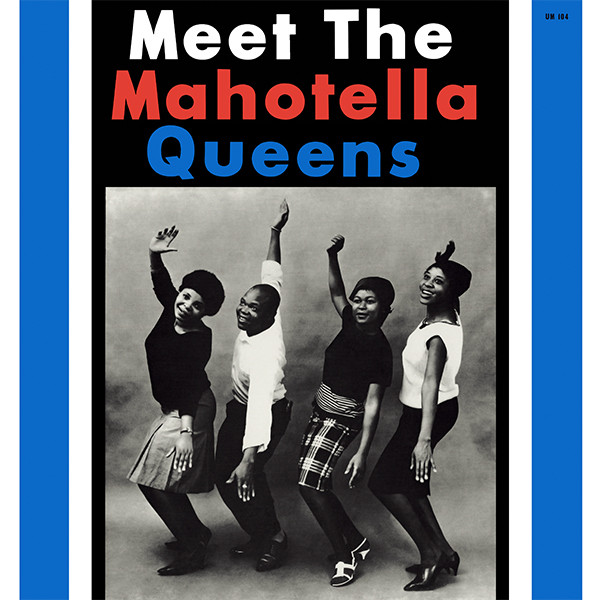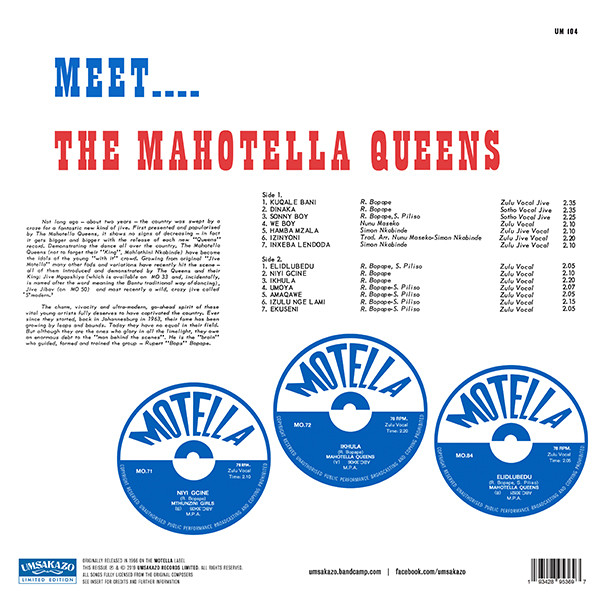ALL RIGHTS RESERVED © CG
Closed today
1 / 0
Mahotella Queens
Meet The Mahotella Queens



Artists
Labels
Catno
UM 104
Formats
1x Vinyl LP Album Limited Edition Reissue Remastered
Country
Release date
Sep 23, 2019
Genres
Styles
$56*
*Taxes included, shipping price excluded
Record still sealed, slight edgewear under shrinkwrap only reason for lower grading.
A1
Kuqale Bani
2:43
A2
Dinaka
2:42
A3
Sonny Boy
2:31
A4
We Boy
2:12
A5
Hamba Mzala
2:14
A6
Izinyoni
2:27
A7
Inxeba Lendoda
2:18
B1
Elidlubedu
2:12
B2
Niyi Gcine
2:15
B3
Ikhula
2:25
B4
Umoya
2:11
B5
Amaqawe
2:10
B6
Izulu Nge Lami
2:21
B7
Ekuseni
2:06
Other items you may like:
The Wormhole: ...Side A: ‘Vodou’. Head priest: Gran Sèvitè Jean-Daniel Lafontant. Vodou priests: Oungan Eddy Saint-Jean and Anperè Jean Céus. Vodou priestesses: Manbo Françoise Célestin, Manbo Christine Lamour, Manbo Marie-Marthe Similien and Manbo Jacqueline Thélus. Other participants: Ounsi and members of Sosyete Na-Ri-VéH. Percussionists: Ountògi and the drummers of The Sacred Temple Na-Ri-VéH 777.Side B: ‘Rara’. All-female rara band: Forever Rara Fanm of Belair.Grand Rue recordings made by AMé in front of the Atis Rezistans, Port-au-Prince on 21 December 2015, 4:54pm to 5:18pm. Vodou ceremony and all-female rara band recorded by AMé at Temple Na-Ri-VéH 777 in Port-au-Prince, 16 December 2015, 9pm to 1am. Edited by Philip Marshall with AMé in Cologne, 16 May 2016. Mastered by Zachary James Watkins at Stank House, 3 August 2016. Artwork by Stefan Fähler. AD&D by Don Wyrm.
Inversions: ...After the release of Technique & Rite in 2017, and the album Terminal Desert release under the name LaBrecque / Barakat earlier this year, here comes the second “official” Crème de Hassan record on Inversions.Whereas the two previous releases were based on longer instrumental jams, Tricontinental Circus is focused on rhythm and language, and the resulting 11 tracks are short and compact, exploring the possibilities of combining these into improbable hybrids.The tracks include Haitian voodoo rhythms, a Burkinabe flute player aligned with a sequencer and a guitar + synth jam with echoes of the sound of early 1970s Düsseldorf.The languages that are dispersed across the album come from Cambodia, Afghanistan, Kenya, Lebanon, Morocco and include an Arabic translation of Nietsche by friend of the band Ayoub El Mouzaine.
boomkat: ...Peter Mekwunye aka Pedro’s self-released side of homebrew boogie pop is a total one-of-a-kind find dating to 1993 Portland, OR, and has been newly discovered by Musique Plastique, who issued Visible Cloaks eponymous debut LP in 2015. Trust that you’ve hardly ever heard such a raw, lo-fi slab so full of soul and vibes as One Kind of Love!As a new arrival from Nigeria to Portland, OR in North West America, Peter Mekwunye assembled a small home studio consisting of casio keyboard, microphone and a multitrack recorder to realise his dream of making and releasing his own music a reality with One Kind of Love. As these things go, Peter self-distributed the album on tape to local shops and it pretty much disappeared without a trace of acclaim In the history books.Fast fwd to the modern day and its rediscovery tees up a total melter of an album for a whole new generation, offering the kind of obscurity that you’d well expect to hear on Awesome Tapes From Africa, especially with its distinctly Nigerian-sounding melodies and loping grooves influenced by Fela Kuti and the piquant dance-pop of William Onyeabor. But this this one ended up coming out in America and therefore kinda by-passed ATFA to end up in its own geo-temporal time-warp.Now remastered from tape by Brandon Hocura at Invisible City, One Kind Of Love’s blend of impassioned pop songs and hushed, spoken word poetry set to wobbling grooves and rhythmelodies possesses a deeply special charm, remaining as testament to the idea of going it alone and finding your place in the world, which, although it only took him 24 years, Pedro has clearly come back into circulation at a time when bedroom boogienauts and dreamers are especially hungry for this stuff - a deeply familiar yet at once alien and enigmatic sort of electronic soul.Highly recommended!
Follow us
Browse
HomeCatalogueLoginServices
Shipping & Returns PolicyTerms and conditions